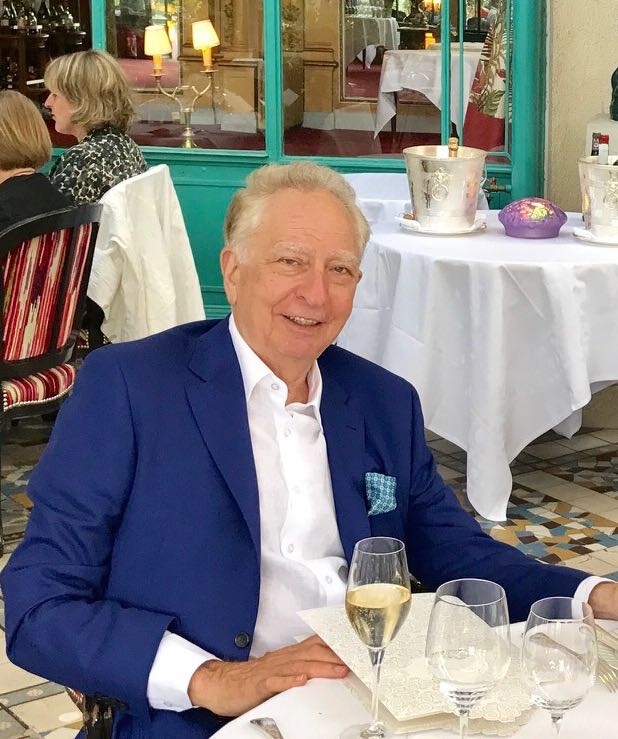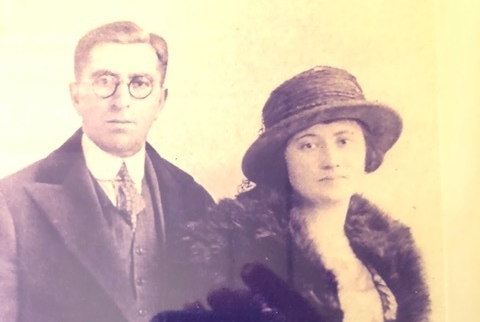Donald Trump's obscene attacks against immigrants from certain benighted parts of the globe prompted me to reread some of the research I did a few years back about the origins of my own grandparents.
On March 7th, 1905 at the New Road Synagogue in East London, Sarah Scheinman, 22, married Nathan « Lou » Lando, 24. His profession, noted on the marriage certificate, was “wood carver”.
He had emigrated to England, about twenty years earlier, with his father Isaac Landau. They came from the village of Shrentz near Plotzk, in modern day Poland. They spoke no English. They were among hundreds of thousands of Jews fleeing the anti-Semitic upheavals in that part of the Russian empire.
Many traveled on foot for weeks to reach Hamburg, a main port of entry to England, one of the very few countries that would accept them. The ships were more like cattle boats with passengers herded together, sleeping on fouled rags or blankets in cramped, fetid spaces between decks.
One reporter covering the arrival of a boat in London 1891 wrote « Of the passengers some were young women wearing shawls on their heads and clad in soiled, faded and torn refinery. Some were men, young or middle-aged, but so enfeebled and spiritless that one might have fixed their age at nearer 70 than 30. A few were old women, bent, emaciated and almost lifeless.
« On landing, scroungers and loafers often robbed the new immigrants of their meager means selling them bogus tickets to the USA and trying to coerce the young unprotected females into prostitution.»
Anti-immigrant feelings, particularly anti-Semitism, were rampant in the U.K. Many established residents reacted with horror to the swarms of desperate aliens piling into the teeming slums of East London.
Sarah Lando--nee Scheinman..
Painfully, against huge odds, my grandparents and their parents and neighbors made their way, learned English, learned a trade, scraped together a living. But they soon decided that seething, impoverished East End of London was not for them.
They took passage to Canada. My sixteen-year old great uncle was first, then my grandfather, Lou. My grandmother Sarah finally came with the children in 1912. Very unlikely they could ever make it into Canada today : no formal education, no real skills, and absolutely no idea what lay ahead.
They were simply determined to flee what lay behind.
My mother’s father, Edward Mitchell, took a different route to North America. He was born Itzhak David Mitzel in 1889 in the village of Monastersytzka, today in the Ukraine. Ed was the second of nine children. Fifty six percent of the population of the town was Jewish. But they were forbidden to own land, to enter the civil service or other professions. My grandfather’s father, Benjamin Mitchell, worked as a butcher out of a shed in his backyard.
Benjamin Mitzel
In 1896, Benjamin scrimped together enough for passage to New York. “After many weeks in steerage, “ one of his sons later wrote, “ my father was overjoyed to see the Statue of Liberty dominating New York Harbor. Although he could not read the inscription- in fact, he never learned to read English—the sight of the Majestic Lady thrilled him. He understood that she represented America’s promise of Freedom and |Hope. » Almost all the Jews who remained behind in Monastersytka perished in the Holocaust.
Benjamin ultimately found work and sent for his family. They came to live in the Lower East Side of New York, an area swarming with other immigrants— Jews, Italians, Irish, Poles. These were tough, gang -infested streets.
In 1896, social reformer William Dean Howells penned a moving description of that tenement world « The Lower East Side, » he wrote «is said to be more densely populated than any other area in the world, or at least in Christendom, for within a square mile there are more than three hundred and fifty thousand men, women and children. One can imagine from this fact alone how they are housed and what their chances of the comforts and decencies of life may be.”
He entered one dank courtyard. “The buildings surrounding it were low and very old. One of them was a stable, which contributed its stench to the odors that rose from the reeking pavement and from the closets filling an end of the court, with a corner left beside them for the hydrant that supplied the water of the whole enclosure. It is from this court that the inmates of the tenements have their sole chance of sun and air. What the place must be in summer I had not the heart to think. I could better fancy this when I climbed the rickety stairs within one of the houses and found myself in a typical New York tenement.
« Then I almost choked at the thought of what a hot day, what a hot night, must be in such a place, with the two small windows inhaling the putrid breath of the court and transmitting it, twice fouled by the passage through the living‑room, to the black hole in the rear, where the whole family lay on the heap of rags that passed for a bed. And for such a dwelling the tenant pays six dollars a month. If he fails to pay it he is evicted, and some thirty thousand evictions have taken place in the past year.
« As there are always pestilences of some sort preying upon the poor (as if their poverty were not enough), my companion could point out a typhus quarter, which the Board had shut up and which we must not approach. It was squalor of a kind which, it seemed to me, it could not be possible to outrival anywhere in the life one commonly calls civilized.
« We were just hungry all the time,” my grandfather, Ed, told us many years later.
His father, Benjamin, earned three dollars a week delivering coal and wood on his back to fuel the stoves in the tenements. But Ed was finally obliged to quit elementary school to help supplement the family income..
Ultimately though, slowly, painfully, with immense drive and sacrifice, my grandparents and their families— and millions of others made it. Some more spectacularly than others ; but they and their children made it.
Edward and Anna Mitchell, nee Schwarzkoop circa 1044
Ed Mitchell pulled himself out of the reeking slums of New York, owned a department store in Boston by the time he was 22 ; went on to make a fortune in Winnipeg, lost it all in the Depression ; made it all over again in Los Angeles. He became a major contributor to medical research and charitable causes in the United States and Israel.
As for my other grandparents, Lou and Sarah Lando, from a small dry-goods store in far-off Prince Rupert, they ultimately became furriers in Vancouver.
Esmong "Bud" Lando
My father, Esmond Lando, who was four years old when he crossed the ocean in steerage with his mother, became a prominent lawyer, Queen’s Counsel. He helped found several companies, including an airline, to open some of the wildest reaches of the Canadian West. My parents backed pioneering groups in music and the arts, my mother, Edith Lando nee Mitchel, receiving the The Order of Canada shortly before her death.
Edith Lando presented with The Order of Canada
Inspired by such examples, others of our family in succeeding generations have reaped commendations and honors in their own chosen fields.
This is not to put the spotlight on my own ancestors. The point is that their stories and tremendously valuable contributions are replicated by the tens of millions of others who fled –and will never stop fleeing-the many shitholes of this world.






